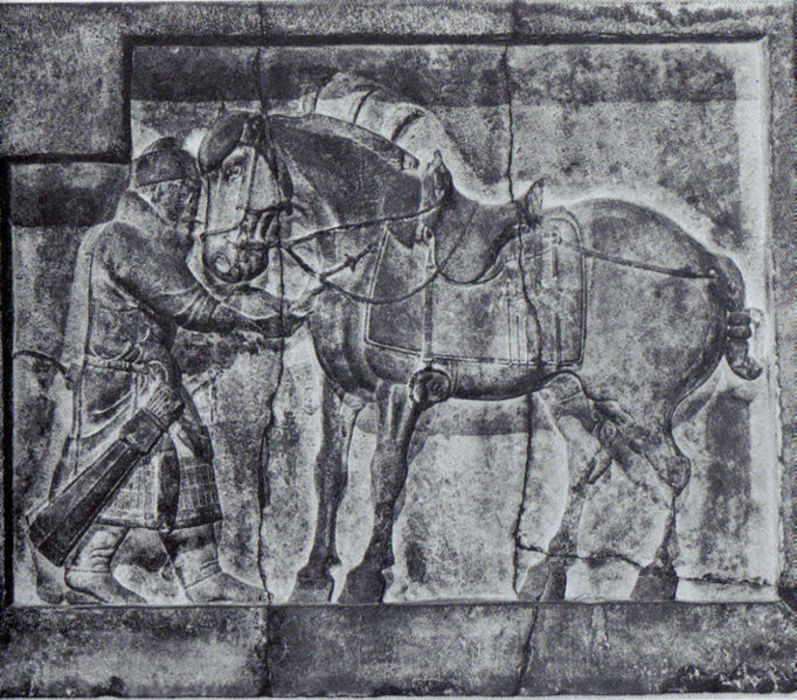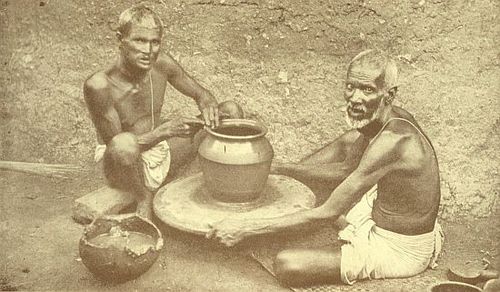Horse have hooves so that they can grip on frost and snow, and hair so that they can withstand the wind and cold. They eat grass and drink water, they buck and gallop, for this is the innate nature of horses. Even if they had great towers and magnificent halls, they would not be interested in them.

Emperor Taizongs horses by Yan Liben
However, when Po Lo [a famous horse trainer] came on the scene, he said, "I know how to train horses". He branded them, cut their hair and their hooves, put halters on their heads, bridled them, hobbled them and shut them in stables. Out of ten horses at least two or three die …

The potter said, "I know how to use clay, how to mould it into rounds like the compass and into squares as though I had used a T-square." The carpenter said, "I know how to use wood: to make it bend, I use the template; to make it straight I use the plumb line."
However, is it really the innate nature of clay and wood to be moulded by compass and T-square, template and plumb line? "Po Lo is good at controlling horses and indeed the potter and carpenter are good with clay and wood." And the same nonsense is spouted by those who rule the world.
On butterfly dreams
The Outline said to the Shadow, "First you are on the move, then you are standing still; you sit down and then you stand up. Why can’t you make up your own mind?"
Shadow replied, "Do I have to look to something else to be what I am? Does this something else not have to rely upon yet another something? Do I have to depend on the scales of a snake or the wings of a cicida? How can I tell how things are? How can I tell how things are not?

Once Chuang Tzu dreamt he was a butterfly, a butterfly flitting and fluttering around, happy with himself and doing as he pleased. He didn't know he was Chuang Tzu. Suddenly he woke up and there he was, solid and unmistakable Chuang Tzu. But he didn't know if he was Chuang Tzu who had dreamt he was a butterfly, or a butterfly dreaming he was Chuang Tzu. Between Chuang Tzu and a butterfly there must be some distinction! This is called the Transformation of Things.
https://www.srds.co.uk/begin/chuang1.htm

Ego is the baggage of the past
But how is it related to the ego? Ego is the past accumulated. Whatsoever you have known, experienced, read, whatsoever has happened to you in the past, the whole is accumulated there. That whole past is the ego, it is YOU!
The past can project into the future - the future is nothing but the past extended - but the past cannot face the present. The present is totally different, it has a quality of being here and now. The past is always dead, the present is life, the very source of all aliveness. The past cannot face the present so it moves into the future - but both are dead, both are non-existential. The present is life; the future cannot encounter the present, nor can the past encounter the present. And your ego is your past. Unless you are empty you cannot be here, and unless you are here you cannot be alive.
If people go on colliding with you and if people go on being angry with you, remember, they are not at fault. Your boat is not empty. They are angry because you are there. If the boat is empty they will look foolish, if they are angry they will look foolish.
Those who are very intimate with me sometimes get angry with me and they look very foolish! If the boat is empty you can even enjoy the anger of others, because there is nobody to be angry with, they have not looked at you. So remember, if people go on colliding with you, you are too much of a solid wall. Be a door, become empty, let them pass.
The Book of Chuang Tzu
Chuang Tzu brought a new notion Chinese philosophy -- that of self-transformation as a central precept in the Taoist process (an understanding that has become central to Tai Chi Chuan). He believed life is dynamic and ever-changing. Chuang Tzu believed that life is transitory and that the pursuit of wealth and personal aggrandizement were vain follies, which distract us from seeing and understanding the world and contemplating its meaning. He strove to see nature with new eyes. Chuang Tzu felt it was imperative that we transcend all the dualities of existence. Seeing Nature at work and the way in which it reconciled these polar opposites pointed the way to the Tao where all dualities are resolved into unity.
Another core belief outlined in the books is that we may come from different pasts and have different experiences but we come together in contemplating the nature of the Tao. Chuang Tzu’s thought can thus be considered a precursor of multiculturalism and pluralism.
Another aspect of the book is the contemplation of the interchangablity of reality and perception and the nature of reality. In a famous except Chuang Tzu relates this story: "Once I, Chuang Tzu, dreamed I was a butterfly and was happy as a butterfly. I was conscious that I was quite pleased with myself, but I did not know that I was Tzu. Suddenly I awoke, and there was I, visibly Tzu. I do not know whether it was Tzu dreaming that he was a butterfly or the butterfly dreaming that he was Tzu. Between Tzu and the butterfly there must be some distinction. But one may be the other. This is called the transformation of things." In exploring these paradoxes, Chaung Tzu reveals that the meaning of the world is bound up in apparent contradictions.
In general, our contemporary understanding of Taoist philosophy is a mix of the ideas of Lao Tzu and Chuang Tzu. These ideas would also have a profound influence on the school of Zen Buddhism which was crossing into China from India.
www.thegreatbookslist.com/chuangtzu.html


